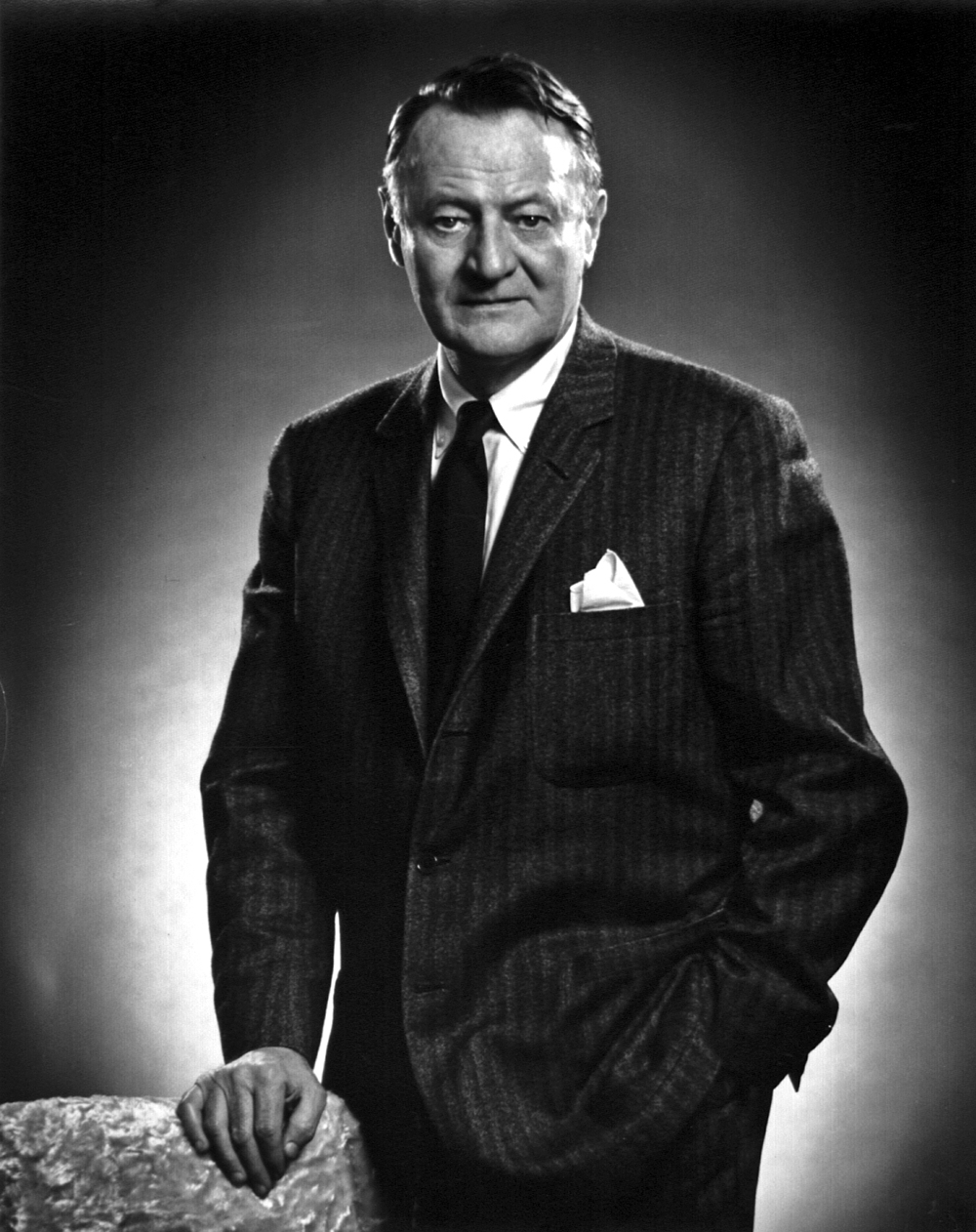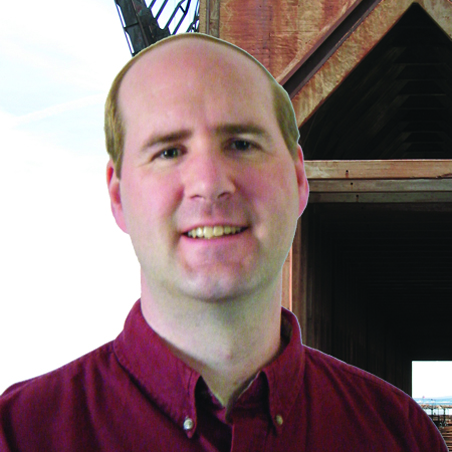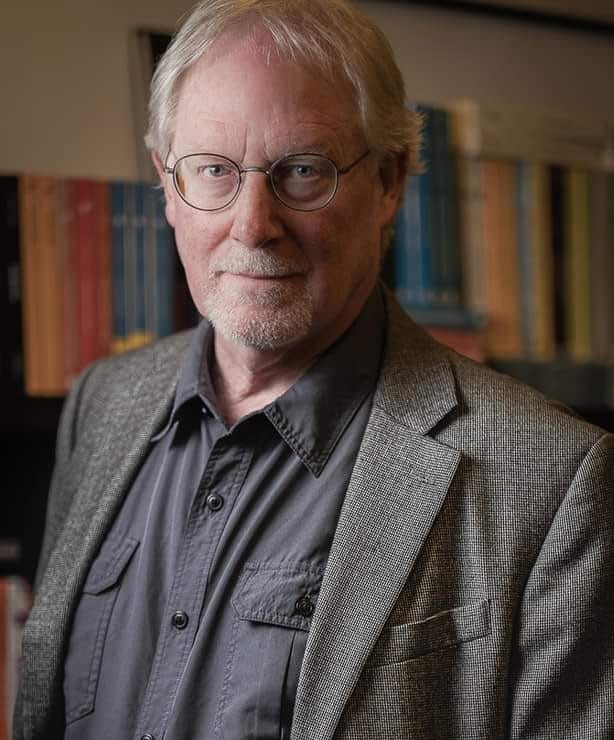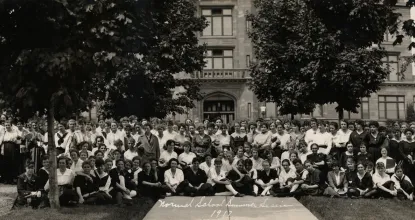Text and research by Bella Markham
As the largest city in the Upper Peninsula, Marquette is home to many creatives, who were further enriched by the establishment of Northern State Normal School in 1899. Its English Department, which focused on educating students on composition, writing, and literature was established the same year as Northern’s inception. The first English teacher at Northern was Flora Hill, who taught until 1905 and was interested in literature and children's stories. Northern has seen many English educators since then. One of the biggest changes in the English department of recent note is the establishment of a Master of Fine Arts creative writing degree, which has produced and is producing unique creative writers.
One of the Upper Peninsula’s most well-known authors is John Voelker (pen name Robert Traver) who was born in Ishpeming on June 29, 1903. Voelker was a writer from age 10, and he studied as a college student at Northern Normal (now Northern Michigan University). Voelker graduated from the University of Michigan’s Law School in 1928, beginning his practice of law in Marquette at the firm Eldridge and Eldridge, before opening his law practice in Ishpeming in 1933. In 1952, Voelker was asked to defend Army Lt. Coleman Peterson who was accused of murdering Mike Chenoweth, owner of the Lumberjack Tavern in Big Bay. This was the case that inspired his most infamous work, Anatomy of a Murder, published in 1958, which remained on the best-seller list for fifteen months. St. Martin’s, the publishing company behind Anatomy of a Murder, had plans to have the book adapted for the screen. Otto Preminger, an Austrian-American film producer, acquired the movie rights and filming began in Marquette County. Working as a Michigan representative for the Supreme Court while Voelker wrote his first novel, his success allowed him to resign and focus on writing. His other prominent novel that included the Upper Peninsula as its setting was Laughing Whitefish (1969), a novel that takes place in the 1800s. His works of non-fiction, two of them being Trout Madness (1960) and Trout Magic (1970), are both inspired by Voelker’s experiences fly fishing in Michigan waters. Voelker died in 1991.
he studied as a college student at Northern Normal (now Northern Michigan University). Voelker graduated from the University of Michigan’s Law School in 1928, beginning his practice of law in Marquette at the firm Eldridge and Eldridge, before opening his law practice in Ishpeming in 1933. In 1952, Voelker was asked to defend Army Lt. Coleman Peterson who was accused of murdering Mike Chenoweth, owner of the Lumberjack Tavern in Big Bay. This was the case that inspired his most infamous work, Anatomy of a Murder, published in 1958, which remained on the best-seller list for fifteen months. St. Martin’s, the publishing company behind Anatomy of a Murder, had plans to have the book adapted for the screen. Otto Preminger, an Austrian-American film producer, acquired the movie rights and filming began in Marquette County. Working as a Michigan representative for the Supreme Court while Voelker wrote his first novel, his success allowed him to resign and focus on writing. His other prominent novel that included the Upper Peninsula as its setting was Laughing Whitefish (1969), a novel that takes place in the 1800s. His works of non-fiction, two of them being Trout Madness (1960) and Trout Magic (1970), are both inspired by Voelker’s experiences fly fishing in Michigan waters. Voelker died in 1991.
A more recent Ishpeming author, Martin Achatz (who was officially born in Detroit, but moved to  the U.P. when he was 7), received his education in the Upper Peninsula. Achatz considered himself a writer even as a young boy. For a fifth-grade career project, Achatz recalls making a shadow box that was a library, a study and someone writing at a desk with a pen in their hand. He attended Ishpeming High School and went to Northern for his Bachelor's. For three and a half years, Achatz studied computer science and math but in his fourth year he decided to switch to an English writing major with a computer science minor. After his education in the U.P., Achatz went downstate to Western Michigan University where he taught for three years. Achatz left WMU and moved back to the U.P. where he started contingent teaching for the English department at Northern from 1995-2000. When the creative writing M.F.A. program was getting started. Beverly Matherne, a poetry and drama professor at Northern, contacted Achatz in 1999 to tell him that they were looking for student poets to apply to the new program. Achatz never saw the poetic route of his career as a part of his life plans. His master's degree was focused on fiction writing where he was creating a collection of short stories for his thesis that Matherne was directing. The two were looking at his work together and when Achatz began reading a descriptive passage, Beverly sat back and said “You know, Marty, I think you’re a poet.” Matherne convinced Achatz to take his first poetry workshop where he studied under Diane Sautter.
the U.P. when he was 7), received his education in the Upper Peninsula. Achatz considered himself a writer even as a young boy. For a fifth-grade career project, Achatz recalls making a shadow box that was a library, a study and someone writing at a desk with a pen in their hand. He attended Ishpeming High School and went to Northern for his Bachelor's. For three and a half years, Achatz studied computer science and math but in his fourth year he decided to switch to an English writing major with a computer science minor. After his education in the U.P., Achatz went downstate to Western Michigan University where he taught for three years. Achatz left WMU and moved back to the U.P. where he started contingent teaching for the English department at Northern from 1995-2000. When the creative writing M.F.A. program was getting started. Beverly Matherne, a poetry and drama professor at Northern, contacted Achatz in 1999 to tell him that they were looking for student poets to apply to the new program. Achatz never saw the poetic route of his career as a part of his life plans. His master's degree was focused on fiction writing where he was creating a collection of short stories for his thesis that Matherne was directing. The two were looking at his work together and when Achatz began reading a descriptive passage, Beverly sat back and said “You know, Marty, I think you’re a poet.” Matherne convinced Achatz to take his first poetry workshop where he studied under Diane Sautter.
Achatz has fond memories of the writing community fostered at Northern, a tight-knit family who celebrated each other's successes and commiserated over failures. It's the anonymity of a large department that Achatz despises, to be one face in a competitive academic environment. Northern has influenced Martin’s work directly, and indirectly, by changing his preferred genre of writing and allowing him intimate connections with authors and friends that have helped move his career forward. Achatz’s first published poem, known amongst fans as “The Squirrel Poem,'' was published in the Patterson Literary Review after being accepted by Maria Mazzioli Gillian, who was a visiting poet at Northern. Because of the size of Northern and Marquette, Achatz still has the pleasure of keeping in touch with his fellow writing graduates, catching up over lunch and drinks and chatting about the good old days. Northern has been generous in fostering Achatz’s ambitions. NMU provided funding to the National Endowment for the Arts (NEA) Big Read program that lead to the NEA hosting an interview between Achatz and Joy Harjo as a visiting writer. It is Northern’s network of professors and colleagues that has proved indispensable to Achatz’s social and business world. Achatz is now working at the Peter White Public Library as an event coordinator, where he can connect Northern with the community of Marquette through workshops and visiting writer’s series.
Another U.P. native, Tyler Tichelaar, was born in Marquette and has been writing since the age of 16. Tichelaar is a graduate of Northern where he received his B.S. and M.A. in English. He then received a Ph.D. in Literature from Western Michigan University and taught at Clemson University before returning to the Upper Peninsula. His family has been in Marquette for seven generations and can be traced back to the 1850 census. Tichelaar uses his family and their history to draw on as inspiration in his books. His interest in storytelling was influenced by his Grandfather, who would tell him stories about growing up in the U.P. and his own generation's history. This led Tyler to do more research on Marquette's history, merging the two passions of fiction and historical research. Through his work, Tyler has gained a new way of looking at things through the lens of history. This framework serves as a vehicle for himself and his readers to connect with Marquette. Walking around town, Tichelaar can notice buildings his family created which only deepens his appreciation of Marquette knowing that his family has had a hand in creating the town. Tyler believes in writing contextual novels, books that use historical people and storylines alongside fictional protagonists. His first three books, The Marquette Trilogy, trace generations of Marquette. The series follows main characters of his novels that are loosely based on his relatives. In his body of work, Tichelaar is filling in the gaps of history and is always finding surprises about the characters he is writing about.
University before returning to the Upper Peninsula. His family has been in Marquette for seven generations and can be traced back to the 1850 census. Tichelaar uses his family and their history to draw on as inspiration in his books. His interest in storytelling was influenced by his Grandfather, who would tell him stories about growing up in the U.P. and his own generation's history. This led Tyler to do more research on Marquette's history, merging the two passions of fiction and historical research. Through his work, Tyler has gained a new way of looking at things through the lens of history. This framework serves as a vehicle for himself and his readers to connect with Marquette. Walking around town, Tichelaar can notice buildings his family created which only deepens his appreciation of Marquette knowing that his family has had a hand in creating the town. Tyler believes in writing contextual novels, books that use historical people and storylines alongside fictional protagonists. His first three books, The Marquette Trilogy, trace generations of Marquette. The series follows main characters of his novels that are loosely based on his relatives. In his body of work, Tichelaar is filling in the gaps of history and is always finding surprises about the characters he is writing about.
Tyler returned to the U.P. to work on his novels, the first of which, Iron Pioneers was self-published in 2006, leading him to read and meet other self-published authors. He joined the U.P. Publishers and Authors Association the same year as his novel’s publication and became President in 2008. While working with the U.P.P.A.A., the group hosted publishing coach Patrick Snow who worked to guide others in self-publishing. At the time, Snow was looking for an editor for his publishing clients. The prospect of independent editing put Tyler on track to create his own business. Tyler began Superior Book Productions (SBP) with his friend Larry Alexander whom he met in 1993 while they were both teaching assistants at Northern earning their master's degrees. SBP is a self-publishing, editing and proofreading service that gives local authors and authors across the globe an opportunity to be independently published. Tyler was president of the U.P.P.A.A. until 2019. Tichelaar is no longer on the board but continues to be active in the organization.
One alumnus from Northern is the current head of Passages North, Jennifer Howard, whose father was one of the founding editors of the magazine. Northern has been publishing works  from submissions across the world through Passages North. The literary magazine was founded at Bay College (formerly Bay de Noc Community College) in 1979. Northern Michigan University began sponsoring the journal in 1996. Howard was born in Escanaba, Michigan and has been involved with stories since she was young. She remembers re-writing picture books she enjoyed as her earliest introduction to writing and storytelling. Howard attended the University of Detroit where she earned an English and Math degree. Jennifer’s English master’s at Indiana University in Bloomington was focused on literature but in her mid-twenties, she realized that creative writing was calling to her. She wrote what she describes as every author's “terrible first novel,” a young adult book, and based on this momentum decided to apply to Northern’s M.F.A. creative writing program. Her return to the U.P. in 2002 gave Howard insight into her love of writing through her discovery of flash fiction. After Jen finished the M.F.A. program in 2005, she enjoyed the art of teaching writing just as much as writing itself. She was hired by the University where she has been educating students for 19 years.
from submissions across the world through Passages North. The literary magazine was founded at Bay College (formerly Bay de Noc Community College) in 1979. Northern Michigan University began sponsoring the journal in 1996. Howard was born in Escanaba, Michigan and has been involved with stories since she was young. She remembers re-writing picture books she enjoyed as her earliest introduction to writing and storytelling. Howard attended the University of Detroit where she earned an English and Math degree. Jennifer’s English master’s at Indiana University in Bloomington was focused on literature but in her mid-twenties, she realized that creative writing was calling to her. She wrote what she describes as every author's “terrible first novel,” a young adult book, and based on this momentum decided to apply to Northern’s M.F.A. creative writing program. Her return to the U.P. in 2002 gave Howard insight into her love of writing through her discovery of flash fiction. After Jen finished the M.F.A. program in 2005, she enjoyed the art of teaching writing just as much as writing itself. She was hired by the University where she has been educating students for 19 years.
Howard was published in the first flash fiction anthology in 2006, with the title Flash Fiction Forward: 80 Very Short Stories, which challenges the notion of how short a story truly can be. It was this introduction to a larger publishing world that kept Howard writing flash-pieces. In 2013, she published her collection of flash fiction stories, How to End Up, which centers around motherhood, heartbreak and doubt. It was in the M.F.A. program that Howard experienced seminal changes in her life and marriage that shifted her personal and literary passions. At Northern, Howard felt embraced by the natural environment which nurtured her sense of wonder. Through the landscape of the U.P., she draws deeper inspiration for the plots, themes and characters of her writing. The power of learning and creating in a small, beautiful place has been an opportunity Howard wouldn’t trade for larger academic spaces. Northern’s writing community has taught her new ways of writing, specifically the former editor of Passages North, Katie Hanson. She taught Howard the transformative idea of “less is more” writing. At Northern, through the combination of workshop and literature courses, Howard learned how to appreciate the voices of others while championing her own. For Jen, getting a degree in a place she wanted to be in has been the most rewarding experience, alongside the ability to work with Passages North which she considers to be a full-circle opportunity.
Three writing professors at NMU, John Smolens, Beverly Matherne, and Paul Lehmberg were all tasked with designing the creative writing M.F.A. based on the already established M.A. writing track. Implementing the M.F.A. in creative writing was a fairly recent endeavor, seeing its first applicants in 2002. The M.F.A. program is one year longer than the typical two-year track education offered at other institutions. While a master's builds on the scholarly, academic and critical studies introduced in a B.A., an M.F.A. is directed toward a specific artistic practice. Northern is proudly one of three colleges in Michigan that have an M.F.A. in creative writing. Smolens, Matherne and Lehmberg created the program to be self-sufficient. They didn’t need outside resources from the administration which came as an advantage as they could create the program how they wanted. Each of the program leaders had unique frames and approaches to writing which helped them create a diverse department. Smolens was the chair of the M.F.A. committee when the program was designed, as well as being the first director once the M.F.A. was up and running. Matherne and Lehmberg also took turns as program directors.
its first applicants in 2002. The M.F.A. program is one year longer than the typical two-year track education offered at other institutions. While a master's builds on the scholarly, academic and critical studies introduced in a B.A., an M.F.A. is directed toward a specific artistic practice. Northern is proudly one of three colleges in Michigan that have an M.F.A. in creative writing. Smolens, Matherne and Lehmberg created the program to be self-sufficient. They didn’t need outside resources from the administration which came as an advantage as they could create the program how they wanted. Each of the program leaders had unique frames and approaches to writing which helped them create a diverse department. Smolens was the chair of the M.F.A. committee when the program was designed, as well as being the first director once the M.F.A. was up and running. Matherne and Lehmberg also took turns as program directors.
Smolens was raised in Greater Boston. He attended Boston College, majoring in English, and received a master's at the University of New Hampshire and then an M.F.A. at the University of Iowa. He taught at Michigan State University for 11 years before joining the English faculty at NMU, where he taught for 19 years, retiring in 2015. John has lived 30 years in Michigan and considers Marquette a particularly special place.
Students of NMU, and Marquette as a whole, create an “insularity,” says Smolens, “a culture in and of itself.” Marquette creates its own culture by being isolated and that comes hand in hand with a sense of resilience. “The Upper Peninsula’s natural environment has had a great influence on my writing," Smolens says,"One of the more common responses to my stories and books is that the weather is often a main character.” He has published 12 novels and a collection of short stories. Five of the novels are based in Michigan, three of which (Cold, Wolf’s Mouth, Out, Fire Point) are set in the U.P. Three of his novels have been Library of Michigan Notable Books (Wolf’s Mouth; Day of Days; A Cold, Hard Prayer). He retired from NMU in 2015 and still lives in Marquette. John is still living in the Upper Peninsula and continues to write and live in an environment that has fostered many memories and novels.
Beverly Matherne, who won seven first-place poetry prizes is the current U.P. Poet Laureate and is one of several tenured faculty who taught poetry in NMU’s creative writing programs. Her love for poetry and storytelling began in 8th grade when her English teacher had read her work before her classmates.
Matherne majored in art history as an undergraduate student because of her love of the visual arts. She had artistic talent and thought that teaching art history would be a good way to make  a living doing what she loved. Matherne’s English professors were interested in her writing, saw her potential and convinced her to make the switch to an English degree. She received her B.A. and M.A. in English, both at the University of Louisiana. Matherne later received a Ph.D. in Drama, from Saint Louis University. She spent time as a graduate teaching assistant of French at the University of California - Berkeley, but because of the high cost of living in California, she gave up the assistantship to work as a marketing-communications writer in the computer industry.
a living doing what she loved. Matherne’s English professors were interested in her writing, saw her potential and convinced her to make the switch to an English degree. She received her B.A. and M.A. in English, both at the University of Louisiana. Matherne later received a Ph.D. in Drama, from Saint Louis University. She spent time as a graduate teaching assistant of French at the University of California - Berkeley, but because of the high cost of living in California, she gave up the assistantship to work as a marketing-communications writer in the computer industry.
Two professors from the English department at NMU interviewed Matherne for a position in 1991 at the MLA Convention in Chicago. She quickly became the top candidate. She had received another offer from Clemson before her campus visit to Northern. Northern wasn’t a hard choice as there was talk that she might be able to teach an undergraduate poetry course. Matherne first arrived at NMU to teach drama, script writing and technical writing. She started publishing her books of poetry, this led her to teach poetry at both the undergraduate and graduate levels. Matherne eventually directed the M.F.A program, headed the visiting writer’s series and served as poetry editor of Passages North literary magazine. As a retired professor, Matherne finds herself continually surrounded by art and literature, steadily publishing her bilingual books of poetry since 1994. Recently, Matherne was included as part of a collection of 229 poets from 59 countries (World Poetry Anthology, [2024] and Universal Oneness [2020]) and An Anthology of Magnum Opus Poems from Around the World, which has 360 poems from 360 poets from 60 countries. Matherne was a past recipient of Northern Michigan University's Excellence in Scholarship Award. In receiving the Marquette Art and Culture's Outstanding Writer Award, Matherne finds gratification in offering poetry workshops for middle and high school students who are always gifted and ready to try new things. As a U.P. Poet Laureate, she is finding poetic inspiration for her poems and recognizes the “healing influence on people'' that the natural environment offers. She is working on her eighth book, inspired by the natural wonders of the U.P.
Paul Lehmberg, the final influential figure in Northern’s M.F.A. program, is no stranger to Marquette’s ability to connect and heal others. Paul received a Bachelor's degree at Concordia College in Moorhead Minnesota where he had a double major in English and Philosophy. Paul received his M.A. and a Ph.D. at the University of Utah, where he concentrated on American literature and thought. Paul first came to Northern in 1978 and he stayed for 38 years teaching American Literature, composition and creative nonfiction workshops. Paul’s area of expertise is creative nonfiction, which he was asked to teachbut the genre did not yet exist. Lehmberg had to build a course from scratch, so he settled on four key nonfiction writing concepts: People, Events, Places and Ideas. This would provide writers with the widest exposure possible, and, as Paul claims, “there isn’t anything else outside of those things.” Paul is a published author, his book of seven essays, In the Strong Woods: A Season Alone in the North Country, was written in his late 20s. Looking back now, Paul recalls a piece of description a few paragraphs long that would not have been written the way it was if not for his interest in Zen Buddhism, as that was the beginning of his interest in this spiritual practice. In the Strong Woods is a collection of six or seven long essays about Lehmberg’s experiences in a cabin in Northwestern Ontario that had been built with friends, where Paul spent the summer writing alone. Paul went intending to gather material for his book and kept an extensive journal which was two or three times longer than the final product and only one sentence in the journal made it into the book.
The landscape of Northern Michigan offers a creative outlet for writers and artists unique to the rest of the state and nation. By being in a small place, authors are allowed the freedom of opportunity that larger cities restrict by competitive environments. The natural environment allows these authors the freedom of expression not often found in more competitive academic workplaces.
